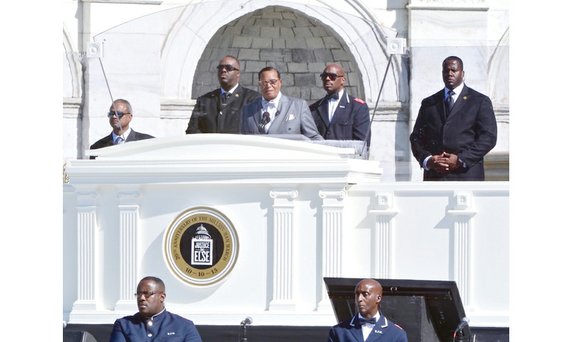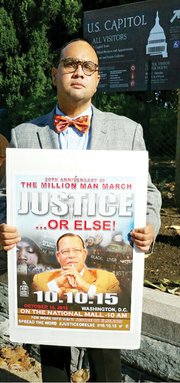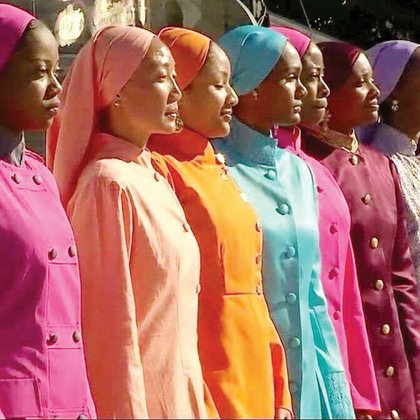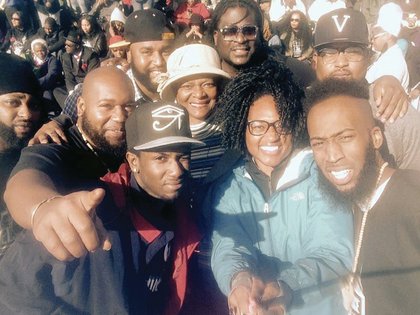Justice Or Else
Million Man March 20th Anniversary draws throngs calling for justice, equity
10/16/2015, 10:22 p.m. | Updated on 10/16/2015, 10:22 p.m.
By Barrington M. Salmon
WASHINGTON
Twenty years ago, 1.2 million African-American men assembled in a blanket of humanity that spread across the National Mall from the U.S. Capitol to the steps of the Lincoln Memorial to attend the first Million Man March.
There, they declared “their right to justice to atone for their failure as men and to accept responsibility as the family’s head.”
Last Saturday, several hundred thousand men, women and children gathered again in Washington under the call of Minister Louis Farrakhan, the leader of the Nation of Islam, for a commemoration of the original Million Man March.
Under the theme “Justice Or Else,” Minister Farrakhan and other speakers crafted a message for a new generation, calling for justice for people of color in the criminal justice system, economic fairness, education equity and full access to voting rights.
During the powerful eight-hour event, they demanded action to change the repressive conditions under which African-Americans, Native Americans, Latinos and other oppressed and marginalized groups exist.
They spoke on issues ranging from police shootings of unarmed African-Americans to the mistreatment of Native Americans to the manner in which many disrespect each other and themselves.
Minister Farrakhan reminded the nation that America was built on the backs of enslaved Africans and African-Americans and that people of color remain oppressed.
He called for people of color to redirect the pain of oppression by withholding their money at Christmas in a massive economic boycott. He said black people spend billions between Thanksgiving and Christmas, with the majority of the money handed to merchants on Black Friday, the day after Thanksgiving.
“Our people have been deprived of the precious essence of life,” Minister Farrakhan said. “Down this Mall, there used to be slave pens. A little yellow house where the man depicted in [the movie] ‘12 Years a Slave’ was held and severely beaten.”
He continued, “I feel the pain of the ancestors, the pain of those on whose shoulders we stand. The young generation has arisen. I see the faces of the young. We who are getting older, myself and my generation, what good are we if we don’t prepare young people to take the torch the next step?” He told the youths, “We see you. We honor you.”
Dr. Charles Shannon, chair of the Virginia and Richmond area organizing committees for the march, described the event as “another glimpse of heaven.”
He estimated at least 400 people from Metro Richmond attended the event. His group alone took four busloads of participants to the event that he described as “peaceful.”
“Everyone was divinely loving, respectful and patient with one another.
“One of the highlights was that many black people, as well as others of all ages, participated — from seniors to little babies,” he said. “I sensed that we all came looking for ways to build a better day now for our people, and God blessed us with what we needed through the participants on the program, especially through the Honorable Minister Louis Farrakhan.”
He said he and others returned to Richmond determined “to keep our sleeves rolled up, build on the momentum, keep our energy focused on achieving justice in the now. With God’s help, we will achieve it.”
Jack W. Gravely, interim executive director of the Virginia State Conference NAACP, had a less than glowing review of the event.
“I was somewhat disappointed in Minister Farrakhan’s presentation,” said Mr. Gravely, who drove to the event with his daughter and 11-year-old grandson.
He said he thought Mr. Farrakhan’s message to African-American men and women to respect each other was important, but added, “I thought he would talk more about economic justice, issues going forward and issuing a stern challenge to the African-American community better than he did.”
The march took place against the backdrop of youth-led protests against the growing incidents of highly publicized killings by white police officers of unarmed black men, women and children. In what many are calling a new era of civil rights, millennial activists in states across the country, including those from the popular Black Lives Matter movement, have been demanding broad, systematic changes in law enforcement and the criminal justice system.
A string of clergy and civil rights leaders hammered similar points one after another. Despite the injustices that remain, some also were able to point to progress over the past two decades.
“There was a young state senator from Illinois out in the audience 20 years ago. His name is Barack Hussein Obama. Now he’s in the White House. So, we’ve made some progress,” Benjamin Chavis, president and CEO of the National Newspaper Publishers Association, told the audience.
“But you and I know we’ve got a lot more progress to make. There’s too much injustice,” he added. “There’s too much inequality. There’s too much mass incarceration. There’s too much in our communities that needs addressing. That’s why we’re here today.”
Among the day’s speakers were Tamika Mallory, executive director of the National Action Network; Carmen Perez, a member of the Justice League New York City and executive director of A Gathering for Justice; Native American activist Jay Winter Nighthawk; Baltimore Pastor Jamal Bryant; the Rev. Willie Wilson; Ron Daniels, president of the Black World 21st Century, who called for reparations for slavery; Christopher Barry, son of the late D.C. Mayor Marion S. Barry; and Emma Lozano, executive director of Centro Sin Fronteras, an organization which works on defending day laborers in Chicago. All electrified the crowd.
The day that started with ecumenical prayers and music around 7 a.m. gradually built and culminated with the long-awaited speech by Minister Farrakhan.
In an address that lasted about two hours, Minister Farrakhan castigated white supremacists, state-sanctioned violence, police abuses and the sorry state of race relations in America.
He spared no one, criticizing elected officials, those in the church and others who have stood with hands at their sides while African-Americans endure racial rancor, discrimination and a slate of behaviors designed to keep non-whites at the bottom of the social ladder.
Trice Edney News Wire Editor-Publisher Hazel Trice Edney and Richmond Free Press staff writer Joey Matthews contributed to this story.










